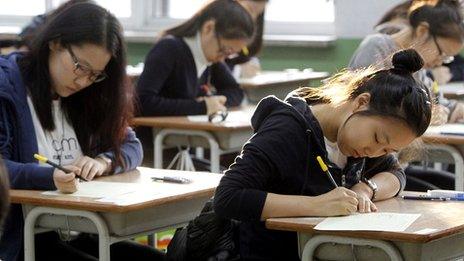Welsh teenagers learn from South Korea school swap
- Published

Tommy, Sarah and Ewan experienced school life in Gangnam, Seoul
Next week's Pisa results will reveal how Wales' education ranks among more than 70 countries, including top performers such as South Korea. But what does it take to have the best performing schools in the world?
Three Welsh teenagers swapped school life in Pembrokeshire for lessons in Gangnam, Seoul, to find out why the country's students perform so well.
Every three years, 15-year-olds in all participating countries sit the same exams in maths, science and reading.
In the last results of 2012, Asian countries including South Korea came out on top in maths but Wales was 43rd - the worst results in the UK.
One obvious difference between the education systems is the long hours South Korean pupils put in.
It was an early start for 16-year-olds Sarah, Tommy and Ewan on their first day at school in Gangnam. Lessons start at 07:50.
The punishment for arriving late at the all-boys school Tommy and Ewan attended is to come in even earlier to clean the school corridors.
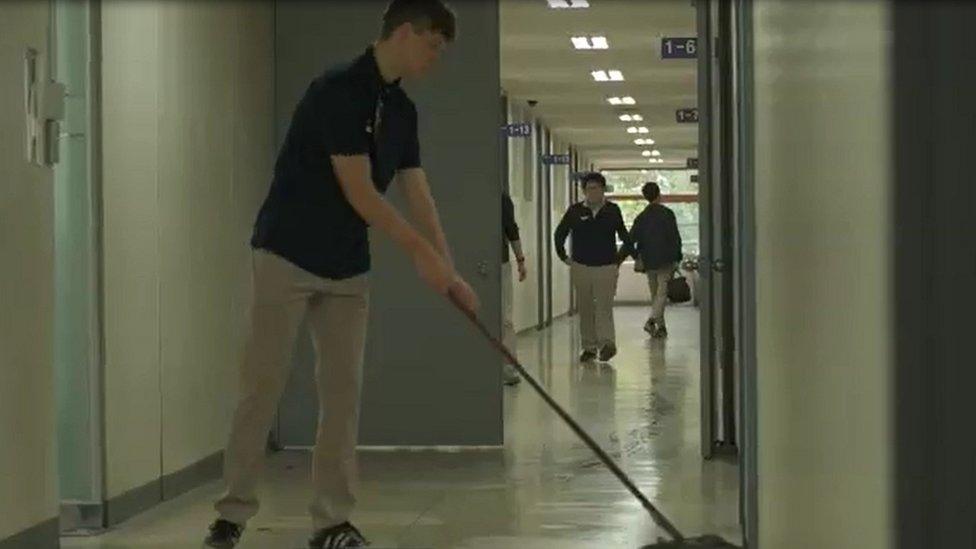
Tommy gets a taste of mopping the floors in the school corridors
And there is a long day ahead because, while lessons finish at 16:20, this just marks the beginning of more study - sometimes until midnight.
Ewan's host Young Chan took him to a five-hour self-study session at the local public library and they had to wait to get in as it was so busy.
He said: "I was amazed that there were so many people all in there at once and the fact they are all exquisitely silent.
"There was a kid in there about 10 years old which was surprising, but shows the work ethic Korean people have - it's just impressive."
Pemrokeshire student struggles with 'intense' South Korean school hours
But studying for 14 to 16 hours is normal for Young Chan.
He said: "I found that if you review your school work that you've learned on that day, it really helps you a lot. The library where I study near my house is only open 'til 10 so if I study more and want to finish my work I just come back to school and stay here until 12."
When they are not studying alone, most Korean students go to private night schools called hagwons.
Korean parents spend more on private education for their children than any other country in the world, but the government has now placed a 22:00 curfew on hagwons to try and control their influence.
Tommy went for a two-hour top-up English lesson with his host, Min Young Sung who said he did not know which school system was better.
"In Wales they get more active and you get more social time, I guess, and we study more. So if we find a middle ground where we can study and engage in those fun activities I think that would be the best."
Welsh students experience South Korea's hagwon night schools
He said the KSAT university entrance exam, offered only once a year, is seen as the make or break exam, not only when it comes to college admissions, but also a teenager's entire future.
Do Yen Kim studied 16 hours a day for three years to get into Seoul University and said some of his friends had committed suicide because of the pressure.
"It was really difficult, especially as in Korea we have a lot of students who want to go to college, the competition's really tough," he said.
"I lost about two or three friends. One was extremely stressed by the studying and the other also committed suicide. They were about 15 or 16."
South Korea has the highest suicide rate in the industrialised world and is the number one cause of death for those aged 10 to 30 years old.
South Korean students finish Welsh GCSE maths paper in 15 minutes
Former minister of education Ju Ho Lee said it was time to make changes to the South Korean school system.
"Those high test scores in Pisa mask very important problems in Korean education, for example, Korean students don't have enough time to read, to do sports, to do music, and to spend that time freely because they are too much pressured to prepare for the exam.
"Even the Pisa test, when they ask Korean students whether they are happy in school, Korean students rate the lowest.
"It's time for Korean parents to make changes to prepare our next generation for the 21st Century. Our children may need a different set of skills other than just high test scores - communication, collaboration and creativity, they should be nurtured."
The government is making changes to the system and Jun Sung Jang, the principal at the boys school, has introduced a school sports day to tackle the problem of stressed out children.
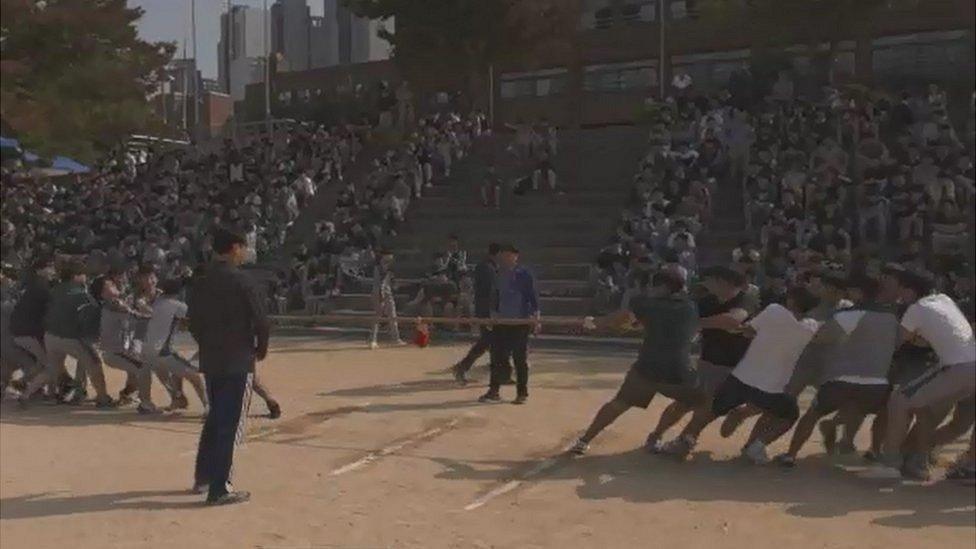
He said: "This time never comes back, this is a beautiful time of our life, but they are squeezed under a big load of pressure. Their day is probably 06:00 til 00:00, with six hours' sleep."
Parents are free to observe teachers in lessons to judge the quality of teaching and will do whatever it takes to get them the best education.
Young Chan's father works away from home all week to pay for his extra tuition. The family has also moved to a small apartment so they could be closer to a good school and a good hagwon, but they only see each other at weekends.
His father said: "From westerners' perspective it's a huge sacrifice, but in Korea separation from your family for the purpose of your child's education is very common, so I can accept it."
The Welsh students' head teacher, David Haynes, would like to bring top maths teachers over from South Korea to fill the shortage in Wales.
"In the health service, we bring across doctors from other parts of the world and they contribute greatly to our society and the provision we receive," he said.
"Specialists and highly-trained professionals coming from other parts of the world like South Korea could contribute greatly to our education system."
Mr Haynes has already introduced some Korean-style changes at his school, reorganising the school day and bringing in parents to help raise standards.
Meanwhile in South Korea, mothers can be found praying for good exam results for their children in the Buddhist temples of Gangnam, and they also burn old text books to destroy any possible bad luck in the upcoming exams.
Sunday Times education editor Sian Griffiths, who took the Welsh students to South Korea for a documentary, said: "It's this religious devotion to education that has helped transform South Korea's fortunes.
"Sixty years ago, nearly 80% of the population here was illiterate, today South Korea is an economic giant. And they did all that through education."
She said South Korea's schools were changing, taking tips from the UK.
But she added: "We're not taking what they already have here [in South Korea] which is a foundation of knowledge, which is the work ethic, which is ambition and aspiration for every child.
"My real fear is these countries are going to be accelerating away from us at an even faster rate than they already are."


What did the trio learn from their experience?
Tommy: "They base their education on fact-based information and memory-based education, thus giving them an advantage in the Pisa testing and other global tests. However, British children are, I believe better prepared for further education and career choices as they understand their knowledge and can apply it."
Sarah: "I understand that the education system in place in Korea is beneficial in the fact that good results are constantly being produced, but I couldn't help but question what the effect of all this work and pressure was on the girls' mental well-being."
Ewan: "One thing I feel we could take from the system is that there is a lot respect for teaching staff in Korea and they have the same social status as we give to doctors, which allows them to get a lot more done and for kids to become brighter."

Part one of School Swap Korean Style can be seen on BBC One Wales at 22:40 GMT on Monday, 28 November.
- Published27 May 2016
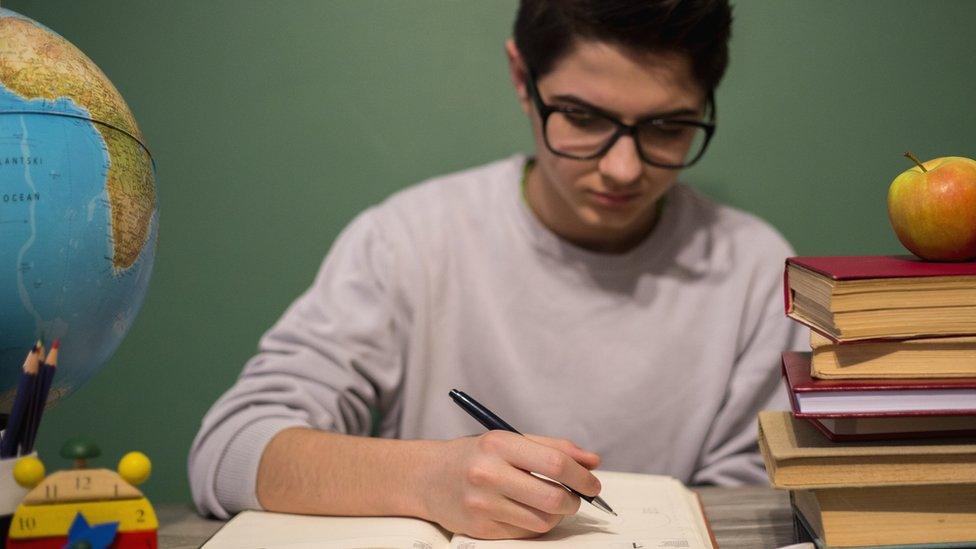
- Published14 October 2015
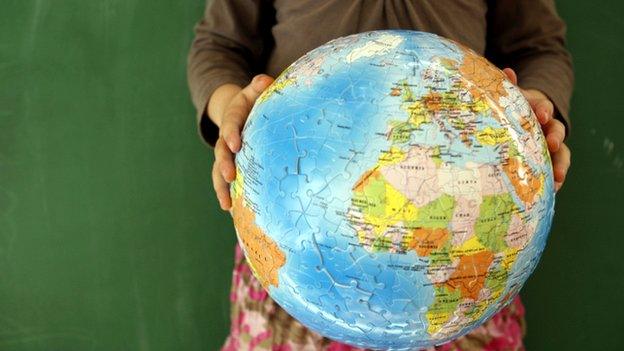
- Published15 September 2015

- Published13 May 2015
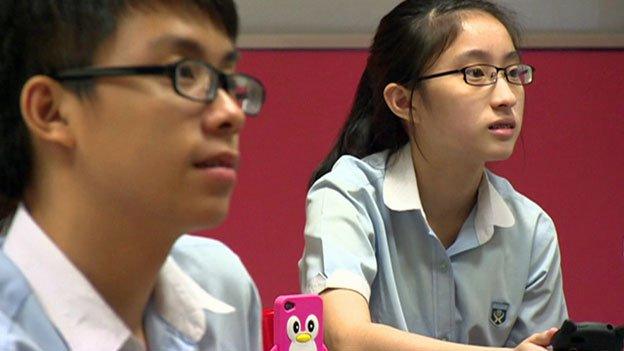
- Published3 December 2013
